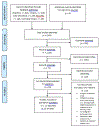A systematic review of interventions for family caregivers who care for patients with advanced cancer at home
- PMID: 32201172
- PMCID: PMC7311285
- DOI: 10.1016/j.pec.2020.03.012
A systematic review of interventions for family caregivers who care for patients with advanced cancer at home
Abstract
Objective: To examine the characteristics of interventions to support family caregivers of patients with advanced cancer.
Methods: Five databases (CINAHL, Medline, PsycINFO, Web of Science, and the Cochrane Library) were searched for English language articles of intervention studies utilizing randomized controlled trials or quasi-experimental designs, reporting caregiver-related outcomes of interventions for family caregivers caring for patients with advanced cancer at home.
Results: A total of 11 studies met the inclusion criteria. Based on these studies, the types of interventions were categorized into psychosocial, educational, or both. The characteristics of interventions varied. Most interventions demonstrated statistically significant results of reducing psychological distress and caregiving burden and improving quality of life, self-efficacy, and competence for caregiving. However, there was inconsistency in the use of measures.
Conclusions: Most studies showed positive effects of the interventions on caregiver-specific outcomes, yet direct comparisons of the effectiveness were limited. There is a lack of research aimed to support family caregivers' physical health.
Practice implications: Given caregivers' needs to maintain their wellbeing and the positive effects of support for them, research examining long-term efficacy of interventions and measuring objective health outcomes with rigorous quality of studies is still needed for better outcomes for family caregivers of patients with advanced cancer.
Keywords: Advanced cancer; Family caregiver; Outcome; Palliative care; Support.
Copyright © 2020 Elsevier B.V. All rights reserved.
Conflict of interest statement
Declaration of Competing Interest None declared.
Figures
References
-
- National Alliance for Caregiving, Cancer Caregiving in the U.S.: An Intense, Episodic, and Challenging Care Experience, 2016. https://www.caregiving.org/wp-content/uploads/2016/06/CancerCaregivingRe... (accessed September 29, 2019).
-
- National Alliance for Caregiving, Caregiving in the U.S, 2015. https://www.aarp.org/content/dam/aarp/ppi/2015/caregiving-in-the-united-... (accessed March 30, 2019).
Publication types
MeSH terms
Grants and funding
LinkOut - more resources
Full Text Sources
Medical
Miscellaneous


